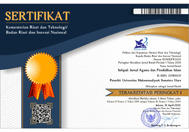Kurikulum Ulumul Quran Bagi Santri di Pesantren Tahfidz
Abstract
Keywords
Full Text:
PDFReferences
Abdurrahman, H. (2022). Kurikulum Tahfiz Enterpreneurship Tingkat Sekolah Menengah Pertama (SMP). Tawazun: Jurnal Pendidikan Islam, 15(1), 117–128.
Al-Qaththan, Manna. (2005). Pengantar Studi Ilmu Al-Quran. Jakarta: Pustaka Al-Kautsar.
Amaliah Supi, Mujahidin. E, Rahman. (2021). Implementasi Kurikulum Tahsin Al-Quran Untuk Remaja di Ma’had Kareem Bil-Quran. Tadbir Muwahhid, 5 (1), 26.
Ansyari, Syahrul. (2018). Muslim Indonesia Terbanyak di Dunia, 70 Persen Belum Bisa Baca Al-Quran.
Daradjat, Zakiyah. (1996). Ilmu Pendidikan Islam. Jakarta: Bumi Aksara.
Hamid, Hamdani. (2018). Pengembangan Kurikulum Pendidikan. Bandung: Pustaka Setia.
Langgulung, Hasan. (1986). Manusia dan Pendidikan suatu Analisa Psikologi Pendidikan. Jakarta: Pustaka Al-Husna.
As-Suyuti, Jalaludin. (1979). Al-Itqan Fi Ulum Al-Quran. Beirut: Dar Al-Fikr.
Lajnah Pentashih Al-Quran (LPTQ) 2018
Ash-Shabuni, Muhammad ‘Ali. (1985). At-Tibyah Fi ‘Ulumil Quran Beirut: ’Alimul Kutub.
Mukhtar, Umar. 65 Persen Muslim Indonesia Tidak Bisa Membaca Al-Quran. Republika.co.id. 12 April 2021
Hamalik, Oemar. (2015). Kurikulum dan Pembelajaran. Jakarta: Bumi Aksara.
Sabiq, Sayid. (2010). Aqidah Islamiyah. Jakarta: Robbani Press.
Sakho, Ahsin Muhammad. (2018). Oase Al-Quran. Bandung: Qaf Media Kreativa.
Sakho, Ahsin Muhammad. (2019). Membumikan Ulumul Quran. Jakarta: PT Qaf Media Kreativa.
Syarifuddin, Ahmad. (2016). Al-Quran Sebagai Sumber Agama Islam, Nukhbatul ‘Ulum: Jurnal Bidang Kajian Islam, 2 (1).
Syukri, Ahmad Harahap. (2018). Metode Pendidikan Islam Dalam Persfektif Filsafat pendidikan Islam. Jurnal Hikmah, 15 (1), 14.
Yusring, Sanusi B. (2018). Islam, Bahasa Arab dan Pengaruhnya Terhadap Bahasa Makasar. Nukhbatul ‘Ulum: Jurnal Bidang Kajian Islam, 4 (2), 153-160.
DOI: https://doi.org/10.30596/11414
Refbacks
- There are currently no refbacks.
Intiqad Jurnal Agama dan Pendidikan Islam is abstracting & indexing in the following databases:
View My StatsEditorial Address:
Faculty of Islamic Religion, Universitas Muhammadiyah Sumatera Utara. Jl. Mukhtar Basri No. 3 Medan 20238 Telp. (061) 6622400 ext. 27 dan 28 Fax. (061) 6625474. e-mail: intiqad@umsu.ac.id

_(1).png)























